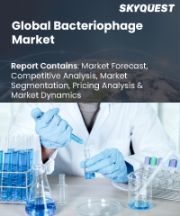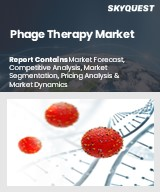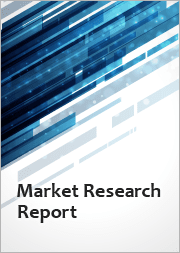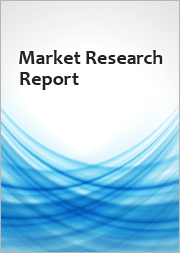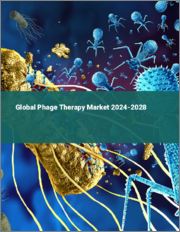
|
시장보고서
상품코드
1632499
파지요법 : 경쟁 구도(2025년)Phage Therapies - Competitive landscape, 2025 |
||||||
보고서 하이라이트
- 2024년 12월, PHAXIAM Therapeutics는 PhagoDAIR I 파일럿 임상 결과를 발표했습니다. 이 결과는 우수한 파지 안전성 프로파일을 보여주었으며, 1회 관절 내 주사를 받은 환자에서 파지 투여군의 감염 조절률은 74%였습니다. 이는 컴퍼니네이트 기반 치료를 받은 환자에서 관찰된 임상 데이터와 일치하는 결과였습니다.
- 2024년 8월, Locus Biosciences는 진행 중인 CRISPR 편집 파지 치료 후보물질 LBP-EC01의 진행 중인 임상 II상 시험의 첫 번째 파트에서 얻은 우수한 약동학 및 안전성 데이터를 보고했습니다. LBP-EC01은 항균제 내성 및 다제내성 대장균에 의한 합병증 없는 요로감염증 치료제로 개발 중입니다.
- 2024년 7월, Armata Pharmaceuticals, Inc.는 앞서 발표한 국방부 보조금(MTEC(Medical Technology Enterprise Consortium)을 통해 받은 NMRC(Naval Medical Research Command)가 관리하는 보조금)에 따라 525만 달러의 비희석 자금을 추가로 수령했다고 발표했습니다. 이번 지원금은 복합 황색포도상구균혈증 치료제로 최적화된 파지 후보물질인 AP-SA02의 임상 개발을 지원하기 위해 수여되었습니다.
- 2024년 3월, BiomX Inc.는 미국에 본사를 둔 APT(Adaptive Phage Therapeutics, Inc.)를 인수한다고 발표했습니다.
본 보고서는 20개사 이상, 22개 품목 이상의 파지요법 의약품에 대한 경쟁 상황을 종합적으로 분석합니다. 제품 유형, 단계, 투여 경로, 분자 유형별 평가가 포함되어 있습니다. 또한, 이 분야의 휴지기에 있는 파이프라인 제품에도 초점을 맞추고 있습니다.
파지요법 보고서 : 평가
- 기업 분석
- 치료 평가
- 파이프라인 평가
- 불활성 약물 평가
- 미충족 수요
목차
소개
주요 요약
파지요법 : 개요
- 분류
- 위험요인
- 진단
- 치료
파지요법 : 분석적 관점 - 철저한 상업적 평가
- 파지요법 제휴 분석 : 기업별
경쟁 구도
- 기업의 비교 평가(치료법, 개발 스테이지, 기술별)
치료 평가
- 평가 : 제품 유형별
- 평가 : 스테이지·제품 유형별
- 평가 : 투여 경로별
- 평가 : 스테이지 : 투여 경로별
- 평가 : 분자 유형별
- 평가 : 스테이지·분자 유형별
파지요법 : 기업 및 제품 프로파일(출시된 제품)
기업명
- 기업 개요
약제명
- 제품 설명
- 연구개발 활동
- 제품 개발 활동
파지요법 : 기업 및 제품 프로파일(파이프라인 제품)
후기 스테이지 제품(단계 III)
- 비교 분석
기업명
- 기업 개요
약제명
- 제품 설명
- 연구개발 활동
- 제품 개발 활동
중기 스테이지 제품(단계 II/III)
- 비교 분석
Locus Biosciences
- 기업 개요
LBP-EC01
- 제품 설명
- 연구개발 활동
- 제품 개발 활동
초기 스테이지 제품(단계 I)
- 비교 분석
SNIPR Biome
- 기업 개요
SNIPR 001
- 제품 설명
- 연구개발 활동
- 제품 개발 활동
전임상 및 탐색 스테이지 제품
- 비교 분석
기업명
- 기업 개요
제품명
- 제품 설명
- 연구개발 활동
- 제품 개발 활동
비액티브 제품
- 비교 분석
파지요법 : 미충족 수요
파지요법 : 시장 성장 촉진요인과 장벽
ksm 25.02.07DelveInsight's, "Phage Therapies - Competitive landscape, 2025," report provides comprehensive insights about 20+ companies and 22+ drugs in Phage Therapies Competitive landscape. It covers the therapeutics assessment by product type, stage, route of administration, and molecule type. It further highlights the inactive pipeline products in this space.
Geography Covered:
- Global coverage
Phage Therapies: Understanding
Phage Therapies: Overview
Phage therapy is an innovative approach to treating bacterial infections using bacteriophages - viruses that specifically infect and destroy bacteria. This method leverages the natural ability of phages to target and kill bacteria without harming human cells, offering a promising alternative to traditional antibiotics. Phage therapy has gained renewed interest in recent years due to the rise of antibiotic-resistant bacteria, which pose a significant global health threat. Unlike broad-spectrum antibiotics, phages are highly specific to their bacterial hosts, minimizing collateral damage to the body's normal microbiome.
The mechanism of action in phage therapy involves phages binding to the surface of bacterial cells, injecting their genetic material, and replicating within the host. This replication leads to the lysis (bursting) of the bacteria, releasing new phages that continue the infection cycle until the bacterial population is eradicated. Each phage strain typically targets a specific bacterial species or strain, making it essential to match the right phage to the infectious agent. This specificity reduces the risk of off-target effects but requires thorough identification of the bacterial pathogen through diagnostic testing.
Advantages of phage therapy include its ability to overcome antibiotic resistance, as phages can evolve alongside bacteria, preventing the development of long-term resistance. Additionally, phage therapy can be used in combination with antibiotics to enhance treatment efficacy. This synergistic approach can disrupt biofilms - protective layers formed by bacteria - which are often resistant to antibiotics alone. Phages are also naturally abundant in the environment, allowing for the potential discovery of new phage strains to address emerging bacterial threats.
Challenges and limitations include the need for personalized phage preparations, as not all phages are effective against all bacterial strains. Regulatory hurdles and the lack of standardized protocols for phage therapy have also slowed its widespread adoption. Moreover, the immune system may recognize and neutralize phages, reducing their therapeutic effectiveness. Despite these challenges, phage therapy has shown promising results in compassionate use cases for patients with multidrug-resistant infections that do not respond to conventional treatments.
Future prospects for phage therapy are encouraging, with ongoing research focusing on developing phage cocktails, genetically engineered phages, and combination therapies. Clinical trials are exploring the efficacy of phages in treating infections such as chronic wounds, respiratory diseases, and sepsis. As the threat of antibiotic resistance grows, phage therapy could play a crucial role in addressing this crisis, offering a targeted, adaptable, and sustainable solution to bacterial infections.
Report Highlights:
- In December 2024, PHAXIAM Therapeutics a biopharmaceutical company developing innovative treatments for severe and resistant bacterial infections, announced the clinical results of the PhagoDAIR I pilot study, demonstrating an excellent phage safety profile and a 74% infection control rate in the Phages arm for patients who received a single intra-articular injection, consistent with clinical data that observed in patients treated on a compassionate basis.
- In August 2024, Locus Biosciences recently reported positive pharmacokinetic and safety data from the first part of the ongoing Phase II trial of CRISPR-edited phage therapy candidate LBP-EC01. LBP-EC01 is being developed as a novel treatment for uncomplicated urinary tract infections caused by antimicrobial-resistant and multi-drug-resistant E. coli.
- In July 2024, Armata Pharmaceuticals, Inc. announced that it has received an additional $5.25 million of non-dilutive funding pursuant to a previously announced Department of Defense grant, received through the Medical Technology Enterprise Consortium (MTEC) and managed by the Naval Medical Research Command (NMRC) - Naval Advanced Medical Development (NAMD) with funding from the Defense Health Agency and Joint Warfighter Medical Research Program. The grant was awarded to Armata to support clinical development of its optimized phage candidate, AP-SA02, as a potential treatment for complicated Staphylococcus aureus bacteremia.
- In March 2024, BiomX Inc., a clinical-stage company advancing novel natural and engineered phage therapies that target specific pathogenic bacteria, announced the acquisition of Adaptive Phage Therapeutics, Inc. ("APT"), a U.S.-based privately-held, clinical-stage biotechnology company pioneering the development of phage-based therapies to combat bacterial infections, and its previously announced $50 million private placement to certain institutional accredited investors, which was led by affiliates of Deerfield Management Company and the AMR Action Fund, and additional investors including the Cystic Fibrosis Foundation, OrbiMed and Nantahala Capital.
Phage Therapies: Company and Product Profiles (Pipeline Therapies)
1. Company Overview: Locus Biosciences
Locus Biosciences is creating a new class of precision biotherapeutics with clinical-stage, engineered bacteriophage treatments for a diverse set of bacterial and microbiome/inflammatory diseases. A world-leading bacteriophage discovery, synthetic biology, and manufacturing platform powers the company. Locus engineer's bacteriophage - naturally occurring viruses that target bacteria - to: 1) kill pathogenic bacteria, while sparing good bacteria, through programmable, precision anti-bacterials with CRISPR-Cas3; and 2) utilize bacteria resident in the body to deliver therapeutic molecules to reduce inflammation or induce other biotherapeutic effects. Its artificial intelligence and machine-learning based discovery engine is targeting bacteria across therapeutic areas including infectious disease, immunology, and oncology. Multiple non-dilutive strategic partnerships validate the company's platform and programs. These include anti-bacterial alliances with Biomedical Advanced Research and Development Authority (BARDA) for its lead Phase II/III asset; and Combatting Antibiotic Resistant Bacteria Accelerator (CARB-X).
Product Description: LBP-EC01
LBP-EC01 is a Locus crPhage therapy in development for the treatment of urinary tract infections and other infections caused by the pathogen Escherichia coli (E. coli). It is a bacteriophage cocktail engineered with a CRISPR-Cas3 construct targeting the E. coli genome. The precision medicine product works through a unique dual mechanism of action utilizing both the natural lytic activity of the bacteriophage and the DNA-targeting activity of CRISPR-Cas3. Laboratory tests and small animal models of urinary tract infection have demonstrated LBP-EC01 is significantly more effective at killing E. coli than corresponding natural bacteriophages, and LBP-EC01 met all primary and secondary endpoints and demonstrated safety and tolerability in a Phase 1b trial. LBP-EC01 is currently being evaluated in a registrational Phase II/III trial for the treatment of UTIs caused by E. coli.
2. Company Overview: Armata Pharmaceuticals
Armata Pharmaceuticals is a clinical-stage biotechnology company focused on the development of precisely targeted bacteriophage therapeutics for the treatment of antibiotic-resistant and difficult-to-treat bacterial infections. Antibiotic overuse has led to the marked rise of multidrug-resistant bacteria, putting us on the verge of a post-antibiotic era in which common infections can be serious or life-threatening. Additionally, the use of broad-spectrum antibiotics is known for disrupting the ecology of the human microbiome, leading to disease. To combat the rapidly growing global problem of drug-resistant bacterial infections, Armata is using its proprietary bacteriophage-based technology.
Armata is headquartered in Marina Del Rey, California, in a 35,000 square foot facility built for phage product development with capabilities spanning bench to clinic. Microbiologists, dedicated to the discovery of natural phages, are complemented by a team of scientists that harness the natural power and diversity of these phages through synthetic biology and engineering. In-house formulation development allows tailoring of the drug product to an indication, and Armata's cGMP drug manufacturing suites and Quality Unit enable the production, purification, testing and release of clinical trial material. All of this is embedded in a seasoned team of professionals with extensive clinical development experience.
Product Description: AP-PA02
AP-PA02 is a therapeutic phage cocktail that targets the pathogen P. aeruginosa, to treat serious respiratory infections, with an emphasis on patients with cystic fibrosis (CF) and non-cystic fibrosis bronchiectasis (NCFB). AP-PA02 is comprised of a cocktail of natural P. aeruginosa phages originating from distinct families and subfamilies, targeting multiple receptor classes, functioning with compatibility and cooperativity, and further characterized by being highly potent and having a broad host range.
AP-PA02 is developed as a sterile liquid formulation, suitable for delivery by inhalation. The clinical trial material of AP-PA02 is manufactured under cGMP at Armata's production facility in Marina Del Rey, California. Currently, the drug is being evaluated in the Phase II stage of its development of Bronchiectasis and Pseudomonal infections.
3. Company Overview: SNIPR Biome
SNIPR Biome is a clinical stage company developing precision medicines for vulnerable patients with difficult-to-treat conditions. The company is pioneering a novel use of CRISPR/Cas technology to better treat and prevent human diseases through precision killing of bacteria or gene modification. SNIPR Biome is a leader in this transformational area of science, with a clinical trial underway, strong IP, and a diverse and experienced team. SNIPR Biome is the first company to orally dose humans with a CRISPR therapeutic and the first company to have been granted a patent for the use of CRISPR for targeting microbiomes. In addition, SNIPR has developed a platform that uses CRISPR technology to achieve gut-directed gene therapy. SNIPR is headquartered in Copenhagen, Denmark.
Product Description: SNIPR 001
SNIPR001, a CRISPR-armed bacteriophage cocktail, is the company's first development candidate targeting E. coli in patients with hematological malignancy at risk of neutropenia. SNIPR001 is being developed in collaboration with the non-profit organisation CARB-X. The aim is to target E. coli bacteria in the gut, and thereby prevent translocation of these bacteria from the gut into the bloodstream, while leaving the commensal bacteria in the patient's microbiome unaffected.
This precision medicine approach is harnessing a novel application of SNIPR BIOME's proprietary CRISPR/Cas technology, hereby potentially transforming the way E. coli infections are prevented and treated, especially in the cancer ward. Currently, the drug is in the Phase I stage of its development for the treatment of Escherichia coli infections.
Phage Therapies Analytical Perspective by DelveInsight
- In-depth Commercial Assessment: Phage Therapies Collaboration Analysis by Companies
The Report provides in-depth commercial assessment of drugs that have been included, which comprises collaboration, agreement, licensing and acquisition - deals values trends. The sub-segmentation is described in the report which provide company-company collaboration (licensing/partnering), company academic collaboration and acquisition analysis in tabulated form.
- Phage Therapies Competitive Landscape
The report comprises of comparative assessment of Companies (by therapy, development stage, and technology).
Phage Therapies Report Assessment
- Company Analysis
- Therapeutic Assessment
- Pipeline Assessment
- Inactive drugs assessment
- Unmet Needs
Key Questions:
Current Treatment Scenario and Emerging Therapies:
- How many companies are developing Phage Therapies drugs?
- How many Phage Therapies drugs are developed by each company?
- How many emerging drugs are in mid-stage, and late-stage of development for the treatment of Phage Therapies?
- What are the key collaborations (Industry-Industry, Industry-Academia), Mergers and acquisitions, licensing activities related to the Phage Therapies therapeutics?
- What are the recent trends, drug types and novel technologies developed to overcome the limitation of existing therapies?
- What are the clinical studies going on for Phage Therapies and their status?
- What are the key designations that have been granted to the emerging and approved drugs?
Key Players
- Locus Biosciences
- Armata Pharmaceuticals
- BiomX
- SNIPR Biome
- Phagelux
- PHAXIAM Therapeutics
- Phico Therapeutics
- Technophage
Key Products
- LBP-EC01
- AP-PA02
- AP-SA02
- BX004
- SNIPR 001
- PL-01-SZ
- Research programme: bacteriophage therapies
- Research programme: antibacterial protein-based therapeutics
- TP-102
Table of Contents
Introduction
Executive Summary
Phage Therapies: Overview
- Introduction
- Classification
- Risk factors
- Diagnosis
- Treatment
Phage Therapies -Analytical Perspective: In-depth Commercial Assessment
- Phage Therapies Collaboration Analysis by Companies
Competitive Landscape
- Comparative Assessment of Companies (by therapy, development stage, and technology)
Therapeutic Assessment
- Assessment by Product Type
- Assessment by Stage and Product Type
- Assessment by Route of Administration
- Assessment by Stage and Route of Administration
- Assessment by Molecule Type
- Assessment by Stage and Molecule Type
Phage Therapies: Company and Product Profiles (Marketed Therapies)
Company Name
- Company Overview
Drug Name
- Product Description
- Research and Development Activities
- Product Developmental Activities
Phage Therapies: Company and Product Profiles (Pipeline Therapies)
Late Stage Products (Phase III)
- Comparative Analysis
Company Name
- Company Overview
Drug Name
- Product Description
- Research and Development Activities
- Product Developmental Activities
Mid Stage Products (Phase II/III)
- Comparative Analysis
Locus Biosciences
- Company Overview
LBP-EC01
- Product Description
- Research and Development Activities
- Product Developmental Activities
Early Stage Products (Phase I)
- Comparative Analysis
SNIPR Biome
- Company Overview
SNIPR 001
- Product Description
- Research and Development Activities
- Product Developmental Activities
Preclinical and Discovery Stage Products
- Comparative Analysis
Company Name
- Company Overview
Product Name
- Product Description
- Research and Development Activities
- Product Developmental Activities
Inactive Products
- Comparative Analysis




